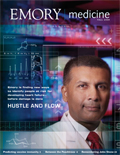Managing conflict of interest better
The School of Medicine rolled out an updated policies on industry relationships with faculty, staff, students, and trainees in early June.
 |
Some highlights include the following:
- Faculty, staff, students, and trainees are prohibited from accepting gifts, regardless of value or nature, from industry.
- No pharmaceutical samples can be accepted.
- No compensation or travel expenses from industry for speaking at promotional industry events.
- Faculty must disclose financial relationships in all formal lectures to medical students and trainees.
The policies follow more than two years of research by the medical school's task force, commissioned by Dean Thomas Lawley, and months of review by the school's council of chairs. "Our new policy may not always prevent the accidents of human nature, but it may help us avoid the six-car pile-up that COI issues can cause," says Lawley.
At a town hall meeting to introduce the policy, Tristram Parslow, who served as the task force co-chair, said, "We never see our own conflicts of interest the way others see them. I always ask two questions, 'How would this look in the newspaper, and why does this company love me?' The processes are not perfect, but the stakes are very high."
Claudia Adkison, executive associate dean for administration and faculty affairs, helped guide the task force's work and gave presentations on the policies to all the school's departments and divisions. Adkison was chair and a founding member of FOCI Academe, the Association of American Medical Colleges' (AAMC) forum on conflict of interest. She also served on the AAMC committee that in February 2008 called on all medical schools to update their conflict of interest policies.


